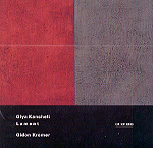Nothing about Giya Kancheli’s music falls into any neatly descriptive category. Even the works themselves, with their very specific, non-traditional structures and scoring–soprano and viola; voice, soprano saxophone, and strings; soprano, clarinet, and 19 players–defy comparison not only with the work of others, but with Kancheli’s own highly individual scores. One common feature in much of this important Georgian composer’s music is the human voice. But even that usually isn’t used in any traditional sense. Although there is a text, as there is in this haunting, sometimes disturbing, always thought-provoking Lament, the voice is so seamlessly woven into the instrumental texture, often rising unobtrusively from a sort of sonic mist, that you regard it as a natural cohabitant in the orchestral sound world rather than just a visitor. Often, the voice is set against a harmonically ambiguous background that cannot strictly be considered accompaniment, but neither is it unrelated to the expressive mood of the vocal line. The solo violin appears and disappears, interjecting its own occasional comments, and the orchestra spins its mostly dark colors into gently swirling clouds that occasionally, sometimes suddenly, burst with release of pent-up emotion. And this is how Kancheli, a master of such moody expressions–especially of sadness–has chosen to give form to his “music of mourning in memory of Luigi Nono.” Soprano Maacha Deubner is a marvelous singer; her clear, perfectly tuned, unaffected tone is ideal for this music. Like all of Kancheli’s works, this one offers another truly unique and unforgettable experience. [11/16/1999]
































